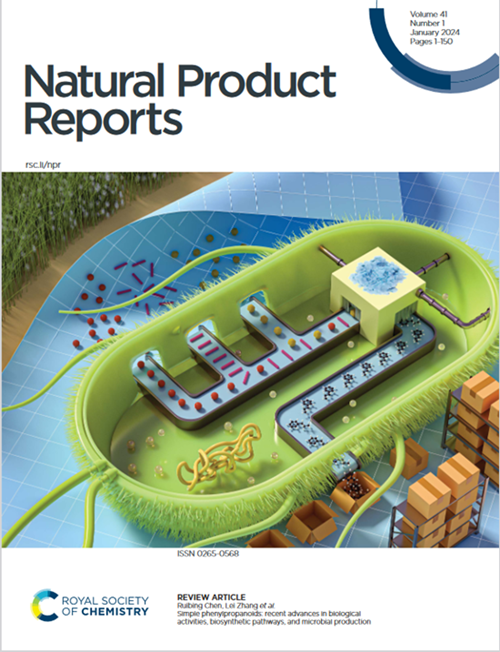抗寄生虫药物发现中的天然产物:进展、机遇和挑战。
IF 10.6
1区 化学
Q1 BIOCHEMISTRY & MOLECULAR BIOLOGY
引用次数: 0
摘要
覆盖范围:至2024年。寄生虫感染了数亿人,造成严重的残疾率和死亡率,并造成毁灭性的社会和经济后果,特别是在发展中国家和地区。几个世纪以来,传统药物一直用于治疗寄生虫病。一些天然产物(NPs)及其衍生物已从这些药物中提取并应用于临床环境,历来引起科学界的关注。近年来,随着革命性技术的发展和应用,从自然资源中发现了更多有前途的化合物,为新型抗寄生虫药物的开发提供了新的可能性。本文综述了从自然资源中开发药物的策略,主要介绍了寄生虫病的病原、流行病学和目前的治疗方法。列出了有前景的NPs及其衍生物,并对其有效性、潜在机理和结构优化进行了描述。随后,讨论了药物开发过程的优点和局限性以及技术在此过程中的作用。本文对基于NPs的抗寄生虫药物的研究与开发进行了展望。高流失率、可及性、可持续供应、知识产权限制等问题仍然阻碍着新产品的发展;然而,奎宁、青蒿素和伊维菌素等经批准的天然产物衍生药物在治疗寄生虫病方面的治疗意义和广泛的临床应用突出表明,天然产物仍然是极有希望的化学制剂储存库。它们独特的结构多样性和显著的生物活性继续激发科学家对新型抗寄生虫药物发现的兴趣。结合最近革命性技术的发展和应用,新产品将为药物发现提供更坚实的基础,并将继续为人类和兽医健康作出重大贡献。本文章由计算机程序翻译,如有差异,请以英文原文为准。

Natural products in antiparasitic drug discovery: advances, opportunities and challenges
Covering: up to 2024.
Parasites infect hundreds of millions of people, result in significant disability rates and mortality and lead to devastating social and economic consequences, especially in developing countries and regions. Traditional medicines have been used for centuries to treat parasitic diseases. Some natural products (NPs) and their derivatives have been derived from these medicines and applied in clinical settings, attracting the attention of the scientific community throughout history. With the development and application of revolutionized technologies over the past few years, more promising compounds have been found from natural resources and provided new possibilities for the development of novel antiparasitic drugs. In this review, we aimed to discuss the strategies used for developing drugs from natural resources and mainly describe the causative pathogens, epidemiology and current treatment of parasitic diseases. Promising NPs and their derivatives are listed, and their effectiveness, potential mechanism and structural optimization are described. Subsequently, the advantages and limitations of the drug development process and the role of technologies in this process are discussed. A prospective analysis of research on and development of antiparasitic drugs based on NPs is presented. The high attrition rates, accessibility, sustainable supply, IP constraints and other problems still hinder the development of NPs; however, the therapeutic significance and broad clinical utilization of approved natural product-derived drugs, exemplified by quinine, artemisinin, and ivermectin in treating parasitic diseases, underscore that natural products remain a highly promising reservoir of chemical agents. Their exceptional structural diversity and marked bioactivities continue to stimulate scientific interest in novel antiparasitic drug discovery. In combination with the recent development and application of revolutionized technologies, NPs will provide a stronger basis for drug discovery and will continue to provide major contributions to human and veterinary health.
求助全文
通过发布文献求助,成功后即可免费获取论文全文。
去求助
来源期刊

Natural Product Reports
化学-生化与分子生物学
CiteScore
21.20
自引率
3.40%
发文量
127
审稿时长
1.7 months
期刊介绍:
Natural Product Reports (NPR) serves as a pivotal critical review journal propelling advancements in all facets of natural products research, encompassing isolation, structural and stereochemical determination, biosynthesis, biological activity, and synthesis.
With a broad scope, NPR extends its influence into the wider bioinorganic, bioorganic, and chemical biology communities. Covering areas such as enzymology, nucleic acids, genetics, chemical ecology, carbohydrates, primary and secondary metabolism, and analytical techniques, the journal provides insightful articles focusing on key developments shaping the field, rather than offering exhaustive overviews of all results.
NPR encourages authors to infuse their perspectives on developments, trends, and future directions, fostering a dynamic exchange of ideas within the natural products research community.
 求助内容:
求助内容: 应助结果提醒方式:
应助结果提醒方式:


